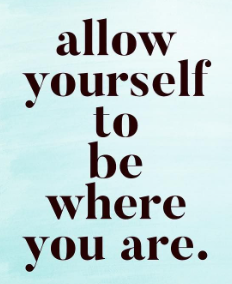Willpower or Self-Discipline?
What is willpower and Self-Control?
In my opinion, willpower and self-control occur when we believe an external plan, diet, or eating approach represents the “right” way to eat. We think that all we need to do is have the will and self-control to follow the rules, and then we’ll be fine.
When we believe the plan is external, we disconnect from ourselves, our lifestyle, our experiences, and our intuition. Instead of using our inner wisdom to guide us toward our goals, we abandon ourselves. Subsequently, we wonder why we can’t muster enough willpower or self-control to reach the goal. It feels like a constant battle against ourselves, and we’ll never win.
Even if we maintain enough willpower and self-control to achieve our goal, we often find that while we may have reached our goal on the scale, our emotional desires for freedom, confidence, and self-approval remain unmet.
When we force ourselves to adhere to the plan, our bodies shrink, and our sense of being shrinks as well. To me, this trade-off is not worth the cost of admission.
Contrary to popular belief:
More willpower and more self-restraint are not the answer to weight loss. They may contribute to the endless diet-binge cycle that many of us have struggled with at one point or another.
When we become attached to a specific way of eating or diet and then pass judgment on that way of eating, we are setting ourselves up for failure. For instance, if we believe that eating low-carb is good, then we also think that when we eat low-carb, we are being good. Conversely, when we don’t eat low-carb, we think that’s not good (or bad), which leads to feelings of shame, guilt, and self-criticism, ultimately leading to overeating.
In many instances, we seek solace in food to console ourselves from negative emotions stemming from our thoughts about ourselves and our relationship with food. The more stringent the rules, the more we feel attached to our diet and the more likely we are to fall off the wagon. Let’s be honest: Nothing is ever perfect in life, not even you and your diet.
When people experience a setback in their efforts to lose weight, they often attribute it to a lack of willpower or self-restraint. The common belief is that by exerting more willpower and self-restraint, they will be able to achieve their weight loss goals. What do you think?
SELF DISCIPLINE, however, is a different conversation.
Self-discipline is about understanding and practicing your personal truths rather than relying on others’ opinions. It involves patience, love, compassion, forgiveness, and much trial and error. When you discover a truth about yourself, your body, or your soul, you should practice living in a way that honors that truth. This isn’t about trying to fit into a particular body type or seeking validation from others but about doing what makes you feel good. I encourage people to try different eating styles to find what works best for them, not just in terms of food but also in terms of lifestyle, responsibilities, and available time.
When you know something to be true, it’s important to honor that belief. This practice is a demonstration of self-discipline, distinguishing it from self-control and willpower.
And it might not look exactly how you thought it should look.
Have you ever wondered why some people have more self-discipline than others or how you can develop more self-discipline?
Like anything else, developing self-discipline is a practice. Therefore, we want to share our top 5 tips for creating more self-discipline. These tips will help you stay on track and make progress toward your health, wellness, and weight loss goals.
Just as a reminder, our definition of self-discipline is the process of getting to know and understand yourself, your body, your truths, and your dreams, and then, with that understanding, practicing how to live in alignment with that truth/honoring that for yourself.
Discipline is not about doing what you think you should or what others are doing or telling you to do. It’s about connecting with what feels good and what you want for yourself and then consciously working towards that. It’s a commitment to living in pursuit of your best life based on your own rules. Self-discipline and self-growth do not make you a better, more worthy, or more whole person, as you already possess those qualities. However, they do help us live more fulfilled and happy lives.
5 Tips on Creating More Self-Discipline:
STEP ONE: Identify what you want and why you want it
It’s essential to be clear about your goal and its significance to you. Many of us focus on what we don’t want, but have you considered what you want to achieve?
Being specific about your goal is crucial. For instance, saying “I want to be healthy” is vague, while stating “I want to lose 25 pounds” or “I want to improve the quality of my food and cook more” is more specific. Setting tangible goals such as “I want to exercise 4 days a week” or “I want to be able to run 1 mile” enables you to take actionable steps towards achieving them.
Step one is simple: Identify what you want and why. This will serve as your anchor throughout the process.
STEP TWO: Take time every morning to connect to your want and your why
Remember to create the mental space to connect with your goals and dreams. This connection serves as the driving force that propels you to take action. Sometimes, we mistakenly identify our lack of motivation as the root cause of our inaction when, in reality, it is our lack of inspiration. We fail to feel inspired by our desires because we are either disconnected from them or too focused on what we lack or don’t want, which leaves us disheartened. It’s essential to dedicate time to envisioning and dreaming about what we want, allowing ourselves to feel excited about our aspirations. This excitement will then catalyze action. This is the inspiration we need. When considering our goals, it’s essential to imagine what achieving them will feel like, its impact, and its benefits. Remember to keep in mind why these goals are important to you.
STEP THREE: Put it on your calendar
Once you have connected to the “want” and the “why” and you are feeling good and excited about it, take the actionable steps that you wrote out and put them on your calendar or your to-do list. Put them somewhere, where they are out of your head and on paper.
This way, when the day takes a turn or emotions try to get the best of you, you can look back and say, “This is what I want.” I wanted this when my head was clear and connected to the goal.
We live in busy times; I know we all have busy schedules. We must get into the habit of putting ourselves back on our to-do lists.
This is why taking care of yourself is essential before you start dealing with the rest of the world or the family. Schedule it in.
STEP FOUR: Allow yourself to be where you are as you work toward the goal
It’s important not to try to force ourselves into change. Just because you’ve taken the time to connect with what you want, understand why, and schedule your action steps into your day doesn’t mean everything will work out perfectly.
This is where the real work comes in, as it’s an opportunity to learn about and understand yourself better. If you get clear about your goals, get excited, write them down, schedule them, and then struggle to follow through, it’s a chance to learn about yourself and what you need to make things work.
You can’t do that if you’re constantly pushing against yourself, criticizing, or rejecting what’s happening. It’s hard to understand what we need or make adjustments to the plan if we don’t know why we started in the first place. And you’ll never understand why if you’re constantly pushing against yourself.
STEP FIVE: Celebrate the Small Wins
Success is a series of small things done consistently over time. Therefore, it’s important to celebrate the little steps you take every day. Drink your water? Recognize it. Packed your lunch for tomorrow? Give yourself credit. Look for the good, acknowledge it, and celebrate your efforts.







